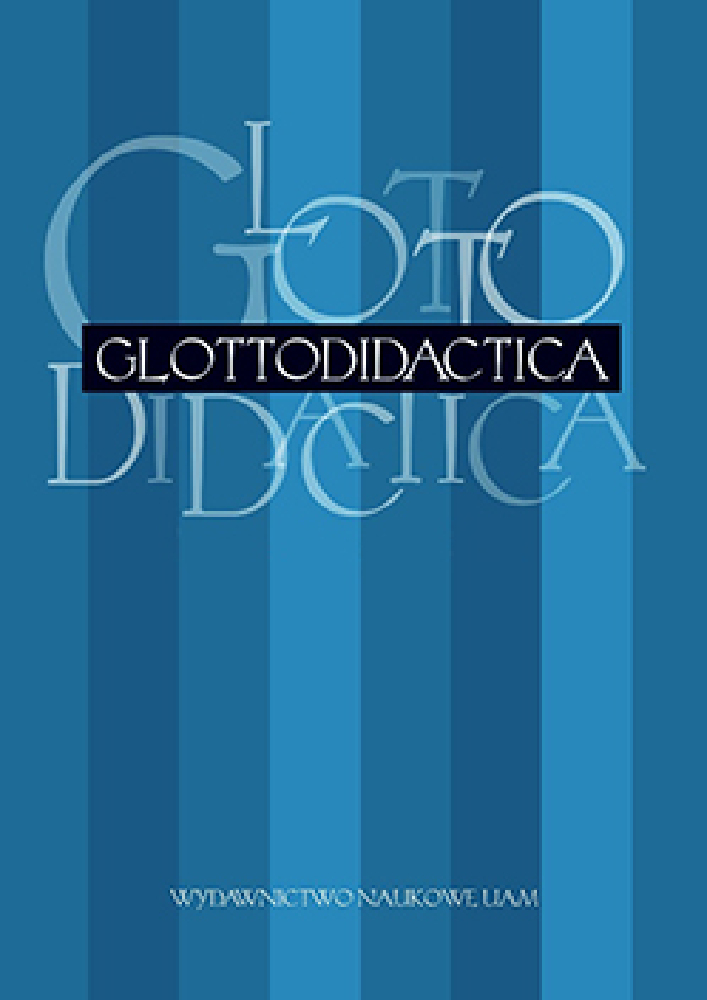Abstract
The aim of this article is to reflect on the implementation modalities of educational policy promoting multilingualism in Poland, a country where linguistic and cultural variety remains relatively low. The article begins with a definition of the concept of “language policy”. Subsequently, the European Union’s directives promoting the policy of multilingualism in the educational context are presented. In this part, the focus is on the following aspects: modern foreign languages, regional and minority languages, certification of language skills and teaching of a curriculum subject integrated into foreign language instruction. The last part of the article concentrates on the implementation of the said directives in Poland. In the research, the author relies on statistical data from various sources to demonstrate that - even if Poland is considered a country where linguistic and cultural variety remains low - foreign (in a broad sense of the term), regional and minority languages are regaining their rightful place in the functioning of the state, including in the Polish education system.
References
Beacco, J.-C. (2016). École et politiques linguistiques. Pour une gestion de la diversité linguistique. Paris: Didier.
Beacco, J.-C. / Byram, M. (2007). Guide pour l’élaboration des politiques linguistiques éducatives en Europe. Version intégrale. Strasbourg: Conseil de l’Europe.
Boyer, H. (2010). Les politiques linguistiques. Mots. Les langages du politique, 94, 67–74.
Cadre européen de référence pour les langues: apprendre, enseigner, évaluer (2001). Strasbourg: Conseil de l’Europe.
Chiffres clés de l’enseignement des langues à l’école en Europe (2012). Bruxelles: Eurydice, unité européenne.
Chiffres clés de l’enseignement des langues à l’école en Europe (2017). Luxembourg: Office des publications de l’Union européenne.
Conclusion de la présidence du Conseil européen du mars 2002. https://www.consilium.europa.eu/media/20935/71026.pdf [accès: 27.11.2019].
Eloy, J.-M. (1997). «Aménagement» ou «politique» linguistique? Mots. Les langages du politique, 57, 7–22.
Kucharczyk, R. (2016). Kontekst nauczania języków obcych w Polsce – glottodydaktyczne implikacje dla drugich języków obcych. Linguodidactica, 20, 195–212.
Kucharczyk, R. (2018). Nauczanie języków obcych a dydaktyka wielojęzyczności (na przykładzie języka francuskiego jako drugiego języka obcego). Lublin: Werset.
Kucharczyk, R. (2020). La place des langues dites majoritaires/minoritaires dans l’enseignement primaire et secondaire en Pologne. Journal of Applied Linguistics, 33, 90–103.
La Charte européenne des langues régionales ou minoritaires (1992). https://rm.coe.int/168007c07e [accès: 5.06.2020].
L’école en Europe – Édition 2012. Rapport Eurydice (2012). Bruxelles: Agence exécutive Éducation, Audiovisuel et Culture.
L’école en Europe – Édition 2017 (2017) Rapport Eurydice. Luxembourg: Office des publications de l’Union européenne.
L’enseignement d’une matière intégré à une langue étrangère (EMILE) à l’école en Europe. Rapport Eurydice (2006). Bruxelles: Eurydice, unité européenne.
Les langues dans l’enseignement secondaire: un aperçu des tests nationaux en Europe – 2014/2015. Rapport Eurydice (2015). Luxembourg: Office des Office des publications de l’Union européenne.
Oświata i wychowanie 2015/2016 (2016). Warszawa: Główny Urząd Statystyczny.
Oświata i wychowanie 2019/2020 (2020). Warszawa: Główny Urząd Statystyczny.
Pawlak, M. (2015). Edukacja dwujęzyczna w polskich szkołach. Raport ewaluacyjny. Warszawa: Ośrodek Rozwoju Edukacji.
Struktura narodowo-etniczna, językowa i wyznaniowa ludności Polski. Narodowy Spis Powszechny Ludności i Mieszkań 2011 (2015). Warszawa: Główny Urząd Statystyczny.
Wojciechowska, B. (2010). Wielojęzyczność w polskim kontekście edukacyjnym. Neofilolog, 35, 63–74.
Wyniki Narodowego Spisu Powszechnego Ludności i Mieszkań 2002 w zakresie deklarowanej narodowości oraz języka używanego w domu. https://stat.gov.pl/spisy-powszechne/narodowe-spisypowszechne/narodowy-spis-powszechny-2002/wyniki-narodowego-spisu-powszechnego2002-narodowosci-oraz-jezyka/ [accès: 19.05.2018].
License
 This work is licensed under a Creative Commons Attribution-NoDerivatives 4.0 International License.
This work is licensed under a Creative Commons Attribution-NoDerivatives 4.0 International License.
Authors
Authors of texts accepted for publication in Glottodidactica are required to complete, sign and return to the Editorial team’s office the Agreement for granting a royalty-free license to works with a commitment to grant a CC sub-license.
Under the agreement, the authors of the texts published in Glottodidactica grant Adam Mickiewicz University in Poznań a non-exclusive, royalty-free license and authorize the use of Attribution-NoDerivatives 4.0 International (CC BY-ND 4.0) Creative Commons sub-license.
The authors retain the right to the free disposal of the work.
Users
Interested Internet users are entitled to use works that have been published in Glottodidactica since 2016, under the following conditions:
▪ attribution – obligation to provide, together with the distributed work, information about the authorship, title, source (link to the original work, DOI) and the license itself.
▪ no derivatives – the work must be preserved in its original form. Without the author's consent, it is not possible to distribute the modified work in the form of translations, publications, etc.
Copyrights are reserved for all texts published before 2016.
Miscellaneous
Adam Mickiewicz University in Poznań retains the property right as a whole (layout, graphic form, title, cover design, logo etc.).
Privacy statement
The names and email addresses published on this journal site will be used exclusively for the purposes declared by this journal and cannot be used for any other purpose or by any other party.





